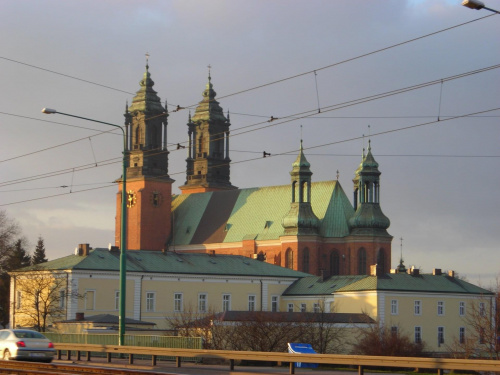Welcome in Poznań
Videos and pictures from Poznań
Poznan is a great city,
Thank you and enjoy ;)
Poznań night life.
SQ
Muchos potatos ;)
Stadium Of Sound Poznań
RMI TRANCE XPLOSION 2008 ARENA POZNAŃ
Global Gathering Poland 2008 - Poznań
Freestyle Mona, Peja, Pele, Sandra, Robak i Fiołas, PTP
Gural Mateo Poznanski stan wiadomosci ;)
Don GURAL Esko POZNAŃ
Poznan Jazz Fair Urbaniak&Golec
If you are in Poznań you should see
Towns Hall
The attic shows a list of rulers of the Jagiełło Dynasty from Władysław II Jagiełło and Jadwiga of Poland to Sigismund II Augustus. In the middle of the parapet there is a small tower with a clock and a mechanism that controls two goats. The current mechanism behind the goats dates from the end of the 20th century. The goats bump heads daily at 12:00 noon.
Below that is the monogram of Stanisław August Poniatowski. A model of an eagle, which survived World War II in hiding, returned to the tower in 1947
Old Town
Stary Browar (old brewery) (rebuild)
Old Polish liblary (Raczyńskich)

Cathedral

Mieszko I, the first known duke of the Polans, built one of his castles in Poznań. The Cathedral Basilica of St. Peter and St. Paul is the oldest Polish cathedral, founded in Poznań during the latter half of the 10th century. The city would become the capital of Greater Poland. Mieszko I's son, Boleslaus the Brave, was crowned king in 1025 and the Kingdom of Poland was formed. Greater Poland became the 'cradle of the Polish state'
Poznań's cathedral is the oldest in the country, containing the tombs of the first Polish rulers: Duke Mieszko I, King Boleslaus the Brave, King Mieszko II, Duke Casimir I the Restorer, Duke Przemysł I, and King Przemysł II.

The name Poznań probably comes from a personal name Poznan (from the Polish participle poznan(y)) and would mean "Poznan's town." It is also possible the name comes directly from the verb poznać which means "to get to know" or "to recognize".
"Teatr Polski" (Polish theatre) Poznań has been build in 19 century. It is interesting part of Kulturkampf between the Germans and the Poles. You know "who is better" Polonisation or Germanisation ?
Finaly Poznań won this war and this is one of the symbols of this war.
Like some Polish banks or like Polish Hotel Bazar Poznań.
19th century in Poznań has been very intereting.
Poznań was like Belfast on the one side the Poles and some old German immigrants. On the other New Germans brought by Prussian authorities and the Jews changing side all the time.
Poznań night life.
SQ
Muchos potatos ;)
Stadium Of Sound Poznań
RMI TRANCE XPLOSION 2008 ARENA POZNAŃ
Global Gathering Poland 2008 - Poznań
Freestyle Mona, Peja, Pele, Sandra, Robak i Fiołas, PTP
Gural Mateo Poznanski stan wiadomosci ;)
Don GURAL Esko POZNAŃ
Poznan Jazz Fair Urbaniak&Golec
If you are in Poznań you should see
Towns Hall
The attic shows a list of rulers of the Jagiełło Dynasty from Władysław II Jagiełło and Jadwiga of Poland to Sigismund II Augustus. In the middle of the parapet there is a small tower with a clock and a mechanism that controls two goats. The current mechanism behind the goats dates from the end of the 20th century. The goats bump heads daily at 12:00 noon.
Below that is the monogram of Stanisław August Poniatowski. A model of an eagle, which survived World War II in hiding, returned to the tower in 1947
Old Town
Stary Browar (old brewery) (rebuild)
Old Polish liblary (Raczyńskich)

Cathedral

Mieszko I, the first known duke of the Polans, built one of his castles in Poznań. The Cathedral Basilica of St. Peter and St. Paul is the oldest Polish cathedral, founded in Poznań during the latter half of the 10th century. The city would become the capital of Greater Poland. Mieszko I's son, Boleslaus the Brave, was crowned king in 1025 and the Kingdom of Poland was formed. Greater Poland became the 'cradle of the Polish state'
Poznań's cathedral is the oldest in the country, containing the tombs of the first Polish rulers: Duke Mieszko I, King Boleslaus the Brave, King Mieszko II, Duke Casimir I the Restorer, Duke Przemysł I, and King Przemysł II.
The name Poznań probably comes from a personal name Poznan (from the Polish participle poznan(y)) and would mean "Poznan's town." It is also possible the name comes directly from the verb poznać which means "to get to know" or "to recognize".
"Teatr Polski" (Polish theatre) Poznań has been build in 19 century. It is interesting part of Kulturkampf between the Germans and the Poles. You know "who is better" Polonisation or Germanisation ?
Finaly Poznań won this war and this is one of the symbols of this war.
Like some Polish banks or like Polish Hotel Bazar Poznań.
19th century in Poznań has been very intereting.
Poznań was like Belfast on the one side the Poles and some old German immigrants. On the other New Germans brought by Prussian authorities and the Jews changing side all the time.
 PolishForums LIVE / Archives [3]
PolishForums LIVE / Archives [3]